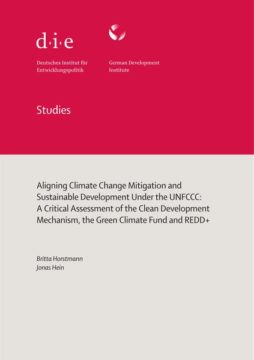Investments in climate change mitigation will have to rise massively in the coming years in order to keep the global temperature increase below 1.5°C. Rising levels of investment in mitigation can reduce the impacts of climate change. Yet, they also increase the risk that these investments adversely affect development opportunities and adaptive capacities. Those who have contributed the least to climate change, but are the most vulnerable to its impacts, could thus face a double-equity gap.
This study analyses to what extent the UNFCCC regime aligns climate change mitigation with sustainable development. First, we analyse sustainable development effects of past mitigation action under the Clean Development Mechanism (CDM). Second, we analyse to what extent the key UNFCCC mitigation approaches – the CDM, Reducing Emissions from Deforestation and Degradation (REDD+) and the Green Climate Fund (GCF) – support the generation of positive effects, or the prevention of negative effects, on sustainable development. Finally, we compare the key UNFCCC mitigation approaches and highlight their main weaknesses and challenges. We argue that the governance approaches of the CDM, REDD+ and the GCF do not sufficiently address the risk of negative effects related to rising levels of mitigation investment.
- Veröffentlicht am Samstag 14. Dezember 2024 von Deutsches Institut f. Entwicklungspolitik
- ISBN: 9783960210436
- 154 Seiten
- Genre: Gesellschaft, Politik, Sachbücher, Wirtschaft
